Transitioning To A Plant-Based Diet 101
A Tell All Guide From a Certified Personal Trainer & Nutrition Nut

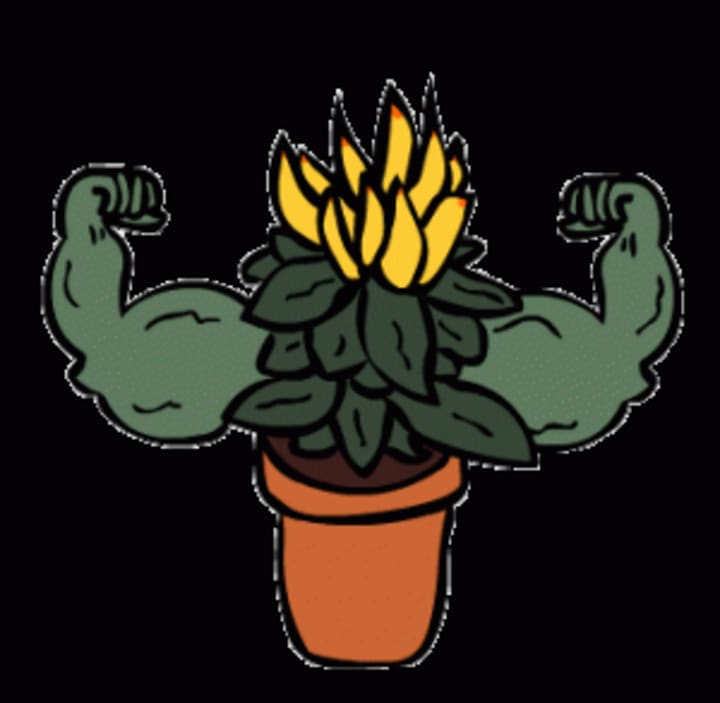
How To Transition to a Plant Based Diet:
One of the most powerful steps you can take to improve your health, boost energy levels, and prevent chronic diseases is to move to a plant-based diet. There’s excellent scientific evidence that many chronic diseases can be controlled, reduced, or even reversed by moving to a whole-food, plant-based diet. Scientific research highlighted in the landmark book The China Study shows that a plant-based diet can reduce the risk of type 2 diabetes, heart disease, certain types of cancer, and other major illnesses. Many people also report bigger fitness payoffs, more energy, reduced inflammation, and better health outcomes after making the switch. Eating plant based doesn't have to mean fully eliminating animal products, but introducing plants as the base of your diet.
There's a lot of info about what & when to eat, what not to eat...it can be very confusing! Forget the fads & always keep it simple & natural. Remember there are no quick fixes or magic pills!
Tip! Stick to these main principles to live a healthy lifestyle:
1. Choosing mainly whole food options
2. Minimizing/eliminating processed & refined foods
3. Portions
4. Lots of veggies! #VeggiesMost
5. Water water water! (AT LEAST 1/2 your body weight in ounces DAILY)
6. Eating a variety of foods from all food groups
7. Exercising moderately - vigorously at least 5 days a week for 30 mins
Odds are if you have been making efforts to eat healthier already, you have probably been eating a lot of plants! Plants don't just include veggies & fruits like we first think, but almost all whole foods (other than animal products) we consume are plants & have grown from the Earth! This includes nuts, seeds, whole grains, potatoes, avocados, legumes/beans, spices, coffee, even chocolate!
You can break it down like this:
LEAVES - lettuce, parsley, cabbage, spinach collards, etc.
ROOTS - potatoes, carrots, beetroot, cassava, radish, parsnip, etc.
STEMS - broccoli, celery, rhubarb, asparagus, etc.
FLOWERS - cauliflower, broccoli.
SEEDS - wheat, rice, legumes, ground nuts (peanuts), tree nuts (walnuts, almonds.)
FRUIT - bananas, berries, pears, plums, pineapple, eggplant, cucumber, grapes, pumpkin.
HERBS & SPICES - cilantro, parsley, cinnamon, paprika, etc.
Our bodies are not evolved to process heavily processed foods on a cellular level, live your life of course, but it is always good to become a little more conscious each day of how we feel inside of our bodies & our minds surrounding certain foods! We have a much harder time breaking down foods, digesting, & absorbing nutrients from foods that have been processed! Processed foods have been directly linked to many diseases, inflammation, & leaky gut.
Remember, there is always a plant based recipe out there to swap that “traditional” one! Even for many processed foods now too! I use recipes from Love & Lemons all the time because they are always delicious! Browse their site for some plant based inspo, tips, & tricks!
https://www.loveandlemons.com/
Check out this awesome reference as well for various types of plant based protein sources & their accompanying macronutrient:
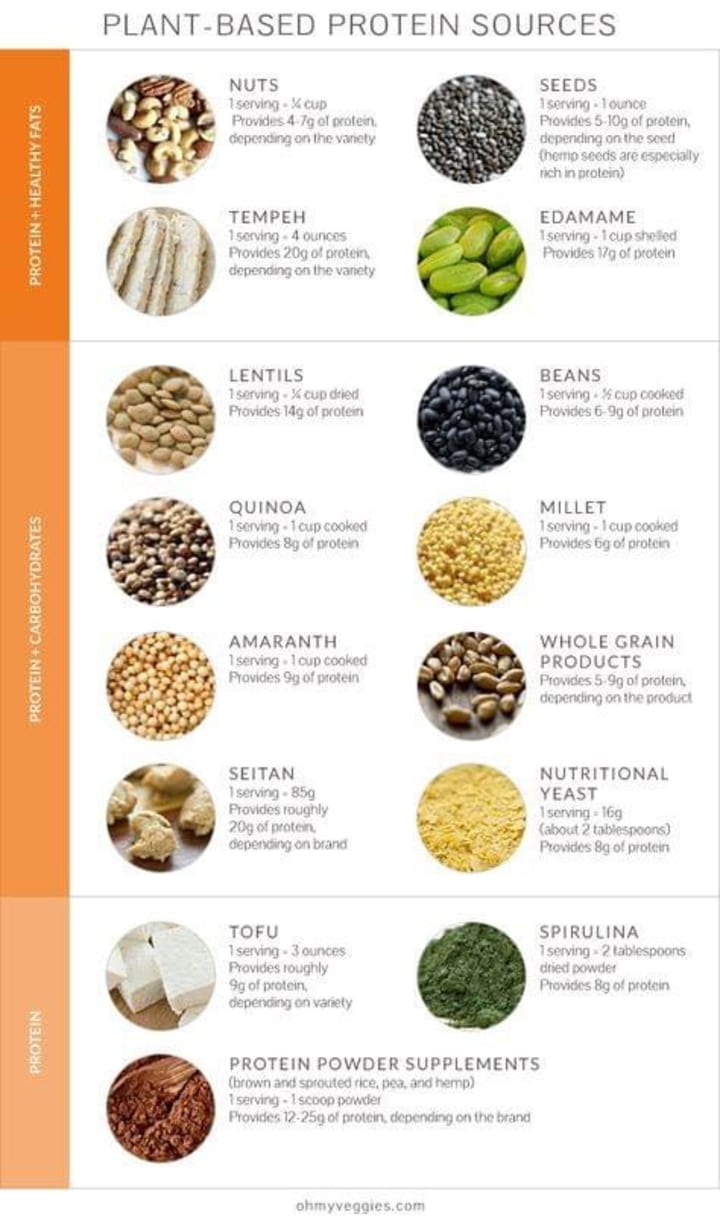
NOTE: I don't necessarily follow those recommended servings, but more as a reference for protein content & what macro nutrients it counts as.
One of the most important things to know, in my opinion, when eating a plant based/vegan diet is how to pair complementary proteins so you are getting all essential amino acids daily. You don't need to have a complete protein at each meal but throughout the day…be smart! Use this resource & feel free to reach out if you have further questions: https://www.verywellfit.com/vegetarian-protein-combining-88265
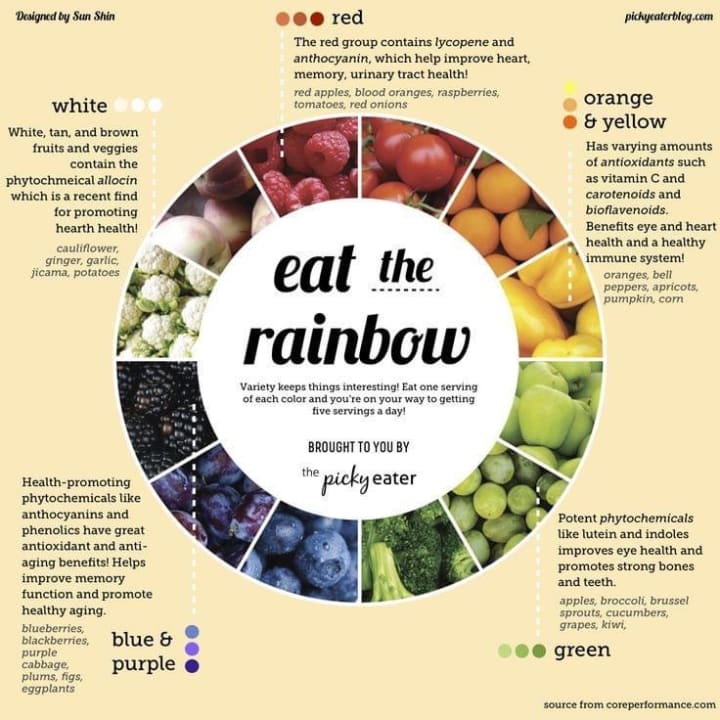
This is the difference between staying healthy vs just swapping out animal products for processed vegan foods!
Let’s break down some common myths & misconceptions surrounding plant based eating that have been B U S T E D:
“I’LL HAVE TO GIVE UP ALL MY FAVORITE FOODS AND SNACKS.”
There might be some you should not eat, but that doesn’t mean you can’t enjoy what you do eat. “You might try saving your favorites for treats, and not eating too much at any one time,” says Marion Nestle. A dietitian can help. Ask about recommendations for vegetarian cookbooks and websites. You may be surprised by the many flavorful foods, tasty desserts, and healthy snacks that you can still eat on a plant-based diet. Some examples? Try frozen fruits like grapes, blueberries, and strawberries instead of sugary popsicles. Stock your fridge with “healthy” snacks like carrots, celery sticks, unsalted nuts, and fruit. Love grilling? Try adding grilled fruit to your favorite summer meals. The Academy of Nutrition and Dietetics website has many recipes and tips: www.vegtariannutrition.net
“IT’S EXPENSIVE.”
Not true. You’ll be eating lots of beans, legumes, and whole grains, which cost less than meat or fish – and they’re packed with protein, vitamins, and minerals. “Throughout history, the human diet has been made up mostly of wheat, rice, corn, potatoes and beans. Even today, these are all inexpensive foods. Leafy greens, some vegetables like broccoli or carrots, and seasonal fruits can be a little pricey, but there are plenty that are not,” says Marion Nestle.
Even if you buy the “more costly” vegetables or fruits, a little bit goes a long way toward filling you up and giving health benefits. Another bonus? “Since you’re eating less meat, you’ll probably have a little extra money in your grocery budget for the higher-priced vegetables and fruits,” says Mark Bittman, food columnist and author of The Food Matters Cookbook and How to Cook Everything Vegetarian.
“I’LL BE EATING ONLY BLAND, BORING MEALS FOREVER.”
That doesn't have to be the case. In fact, most experts argue that eating a large variety of foods is the best way to eat healthy and get all the nutrients your body needs. “Even if you follow a diet that is 80% or 90% plants (which is a lot), there’s still plenty of variety to choose from,” says Mark Bittman. Try browsing the produce aisle of your supermarket. Most are loaded with a huge variety of vegetables and fruits, especially in season. You’ll also find many varieties of beans, nuts, seeds, legumes, pastas, noodles, rice, cereals, grains, spices and herbs. Explore ethnic foods and new styles of cooking. For example, Indian cuisine does amazing things with lentils, spinach, and spice. Make it fun. Try foods you’ve never eaten before. Look for new recipes. There are several good cookbooks geared for people who want to experiment with plant-based diets.
“I CAN’T EAT OUT AT RESTAURANTS ANYMORE.”
Really? It’s true that eating healthy when dining out can be a challenge in a world filled with fast-food restaurants, but it’s not impossible. Almost all restaurants nowadays have some meatless choices on the menu, like salads, soups, or pastas. Try coming up with a strategy for the nights you dine out, like choosing several vegetable side-dishes or soup and salad. Call ahead and ask if they’re willing to make substitutes. “Unless you’re only going to fast-food places, every restaurant can accommodate a plant-based diet nowadays,” says Mark Bittman.
“DINING AT SOMEONE ELSE’S HOME WILL BE IMPOSSIBLE.”
Remember, a plant-based diet means eating less animal products, but it doesn’t necessarily have to mean excluding them completely. You don’t have to shy away from dinner invitations and parties or worry about insulting your host. You can still show up and eat whatever your host offers. Make it one of the nights you allow yourself to eat meat, fish, or poultry. “If you know your host well enough, a word in advance about your preferences can go a long way,” says Marian Nestle.
“I WON’T GET ENOUGH PROTEIN, VITAMINS, CALCIUM, AND OTHER NUTRIENTS.”
Not true. By eating a wide variety of wholesome foods, you can get all the nutrients your body needs. Beans, whole grains, fruits, and vegetables are packed with nutrients. You simply need to change the proportion of what you eat in favor of others. Remember, you can still eat your favorite animal-based foods. You just eat smaller portions and less often. Think of meat as more of a condiment rather than “the meat and potatoes” of your diet. Your body will thank you on a cellular level. A health professional or dietitian can help you create a meal plan that’s right for you.
Want an easy way to start eating less meat? Go Meatless Monday every week, and get regular tips and recipes by following #MeatlessMonday and learning more at MeatlessMonday.com.
MY TIPS TO STICKING TO YOUR PLANT BASED DIET WHEN TRAVELING, VISITING YOUR PARENTS, EATING OUT, ETC.:
First let me say, life happens. We don't need to label ourselves any certain things. The most important thing is to make healthy choices at least 80% of the time that aid in disease prevention. If it feels restrictive or stressful to say that you are vegan, plant based, vegetarian, etc. then don't slap a label on it! If it empowers you then go for it! The point being is do what feels right for you, makes you happy, & healthy!
The Tips:
Know why you are choosing to eat this way, everyone has their own reasons!
Prepare & plan ahead!
If you know you won't be on your normal routine/home, shop for beans when you get there or ask your host if they wouldn't mind buying some during your stay.
You can do a fast soak on the beans & boil them up while you unpack when you first get there. Make a recipe or 2 - enough that will last your stay, & most people have rice & veggies. If not then shop for those ahead too & prep all together at the beginning of your stay to eat throughout. These few preparations will keep you on track all week. Preparing isn’t half the battle…it IS the battle. If you prepare, you’re over 50% more likely to eat at least some of your planned meal rather than ravenously grab a less healthy choice because you’re so hungry at that point.
Get yourself dairy free cheese, ice creams; anything you know you might realistically be indulging in when the social gathering/vacation/event happens, now you can stick to your choices & enjoy munching along with everyone!
Amazon prime & many other services offer delivery, you can also shop at Whole Foods or other delis for pre-made bean, lentil, etc. dishes!
There are tons of ready-made plant based dishes now, especially options in the freezer section. Power bowls, beans, even if chick'n, beyond meat, or similar brands aren’t always the best choice every day due to additives…they are still a wonderful choice for times like this when you are in a pinch and want to be cruel free in your diet!
Bring snacks when you leave the house. I always have one, my go to's in my bag are: clementines, apple, celery sticks, a Beachbody Shakeology packet or vegan Beachbody Beachbar! (Reach out to me for a discount on these if interested!)
Eating out: check out the menu ahead of time & commit to your choices, most restaurants will accommodate you if you ask! You can even call ahead, & don't be afraid to double check & ask that certain options are meat/cheese/etc. free before ordering! You’re the one paying for your meal after all.
Stay informed on plant based education & the facts/benefits of it. This can help be a wonderful reminder to yourself on why you fuel & nourish your body, despite the social pressures of a Standard American Diet.
If possible find like minded people to support you wherever you are, even if they aren't choosing plant based themselves. Tell them you want to stay committed to it & ask for their support! You might be surprised how they can help!
Help out & make/bring a dish when going to a friends/family/holiday event that you know works for you & everyone will love too!
Heads up! When transitioning to a plant based diet there is a good chance your belly will be rumbly & bloating. This is simply because you are switching to a high fiber diet. During this transition phase, your gut is colonizing the new bacteria it needs to aid in digestion. Over time, your body will adjust to the increase of fiber in your diet & you will have less gas & bloating! Ride it out & trust the process! Although you may bloat in the beginning, your body will begin to heal & not have the inflammation & possible long term disease development that is linked to many animal meats & products! This is where gut health and the gut-brain connection comes in. Look out for my future article all about understanding gut health and how it even effects our brains and mood.
Rock your choices with confidence & make being plant-based normal! I know sometimes family & others can lay on the pressure, but if you can be content in your choices without worrying what anyones thinks, THAT is when others start to pick up your vibe & question their own choices! You don't have to explain yourself to anyone or convert/judge. Just own your decisions because they are the right ones for y o u!
Now that we know these tips to take note of…
HERE ARE SOME GREAT IDEAS FOR PLANT BASED GROCERY SHOPPING:
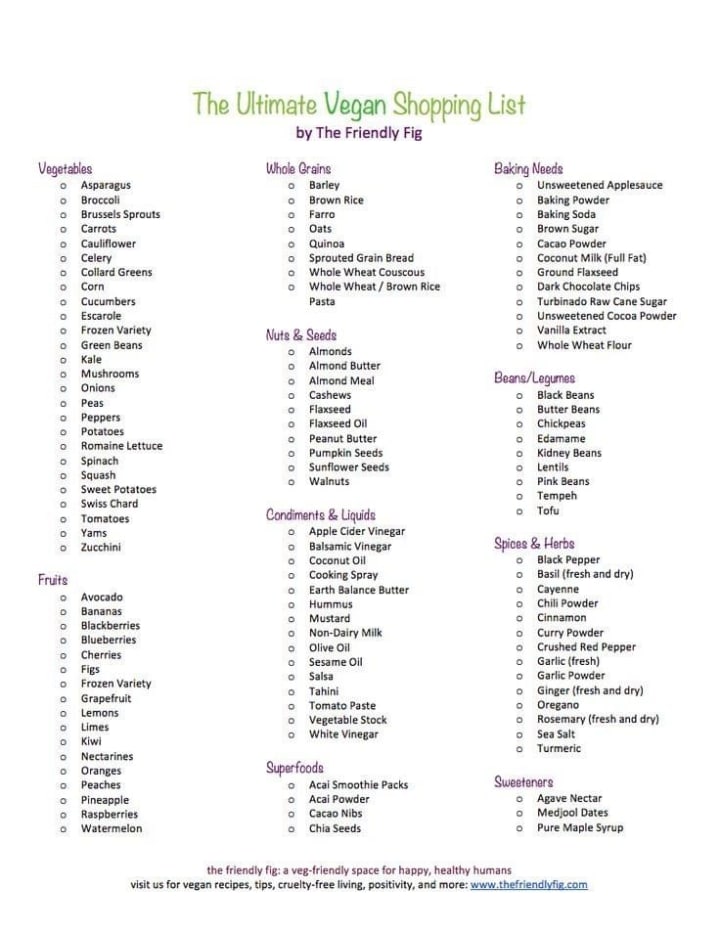
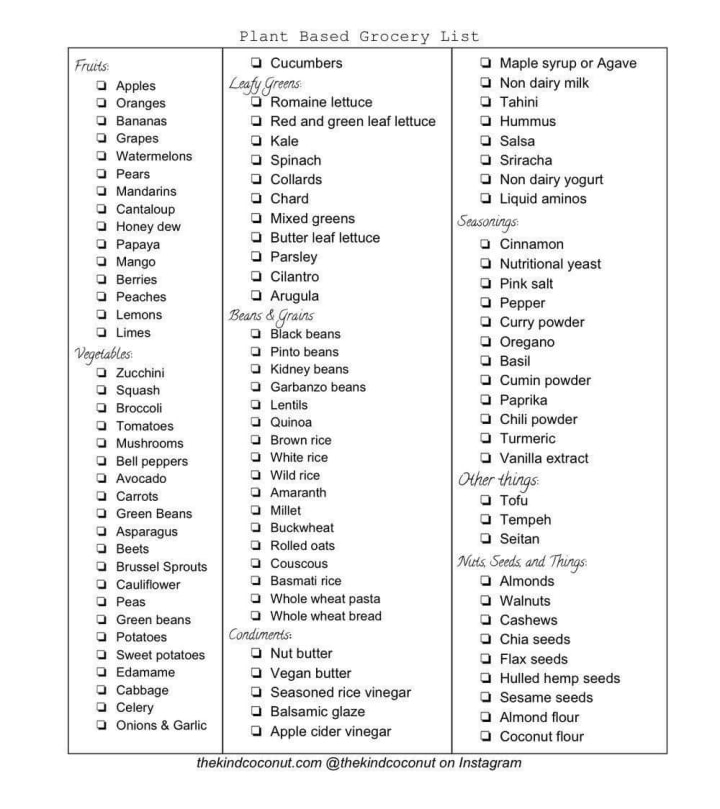
See under "seasonings" Nutritional yeast; Nutritional yeast will be your new bff when eating plant based. It tastes great on anything -- veggies, soups, it makes it taste more cheesy tasting & is a great source of b vitamins, most importantly vitamin b12! Check out the resource below!
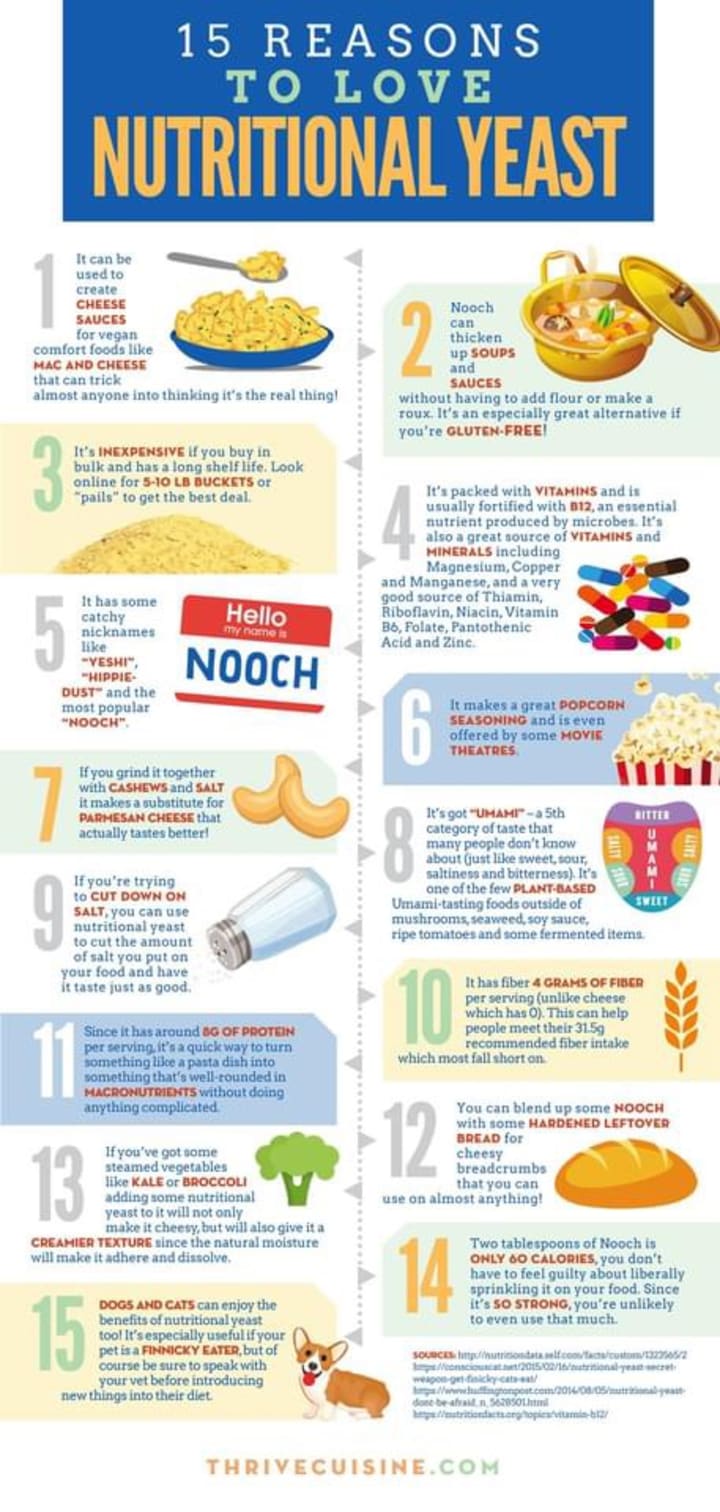
Always read nutrition labels when buying products outside of produce. The back of the package is where all the info we want to focus on is, not the claims on the front! Yes words like 'organic', 'whole grain' & 'dairy free' are great, but not if it is being swapped with unnecessary ingredients & chemicals! Besides the nutrition facts where the calories, etc. are, read the ingredient list!
Keep an eye out for:
Minimal ingredient list: ideally 6-8 whole food items or less unless it is something like Shakeology, for example, loaded with superfoods & such.
We want to be able to recognize the words on there, otherwise it’s not the best choice! Our bodies have to process what we feed it on a cellular level! It uses what we give it to fuel ourselves & give different functions to our organs and entire body.
The first 3 ingredients are mainly what make up the product!
What to Avoid:
Added sugars & high fructose corn syrup
Artificial flavors & sweeteners such as sucralose & aspartame
Refined/enriched/bleached sugars & grains
Hydrogenated oils, canola oil, soybean oil and lecithin
- Preservatives like BHA & BHT
- Colors & dyes
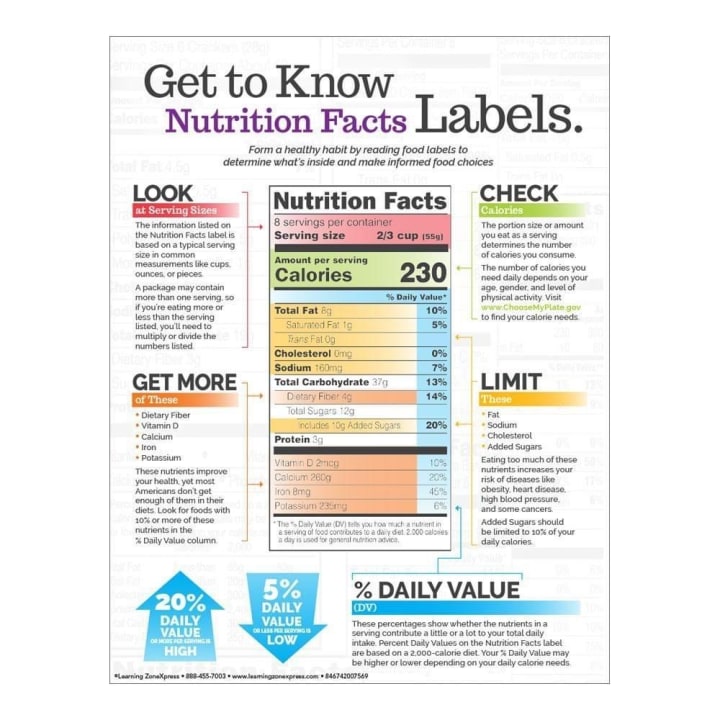
WANT TO KNOW WHAT TIED THE KNOT ON MY DECISION TO COMPLETELY TRANSITION TO A WHOLE FOOD PLANT BASED DIET AS A CPT?
The Game Changers! ← Check out this awesome, informative documentary on Netflix. Everyone should watch this regardless if you plan to transition yourself. There is a second one coming to Netflix soon too.
I LEARNED FROM WATCHING THIS, BUT DID YOU KNOW THAT THE ANIMALS WE EAT ARE JUST THE MIDDLEMEN IN OUR PROTEIN CONSUMPTION?
"Since we’ve been programmed to believe that meat and other animal foods are the only and/or ideal source of protein, these foods are what most people eat to make sure they get enough. What most people don’t realize is that the animals they are eating are really just middlemen, since the majority of these animals get their protein from plants, where all protein originates. In fact, most of the largest and strongest animals on the planet, like elephants, rhinos, horses, and gorillas — are herbivores. And yet, they get more than enough protein to build large muscles and maintain good health." - The Game Changers (seen on Netflix.)
For more awesome info you can trust, check out their website as a source for more plant based knowledge!
https://gamechangersmovie.com/food/protein/
https://gamechangersmovie.com/benefits/maximizing-performance/the-plant-based-advantage/
We are aiming to minimize/eliminate consistently eating meat, dairy, egg products in the future & swapping for whole food plants. Unless you’re eating farm fresh eggs from your own yard, there is zero insurance the source of them is humane. Nothing has to happen overnight, so don't be too hard on yourself — more knowledge is always a great thing! And applied knowledge is power. It can be as simple as swapping one meal a week! Let the transition be natural to you, never a forced chore! Also, it is best to steer clear from refined & processed foods whether animal-free or not, as well!
Again, a whole-food, plant-based diet is based on the following principles:
"Whole food" describes natural foods that are not heavily processed. That means whole, unrefined, or minimally refined ingredients.
Plant-based means food that comes from plants and doesn’t include animal ingredients such as meat, milk, eggs, or honey. Focus on the word “based.” It means the basis of your diet is plants, it doesn’t need to mean 100% unless that is your preference.
A whole food, plant-based diet lets you meet your nutritional needs by focusing on natural, minimally-processed plant foods that offer all the nutrients we need, straight from our Mother Earth.
Here’s a quick overview of the major food categories you’ll enjoy on a plant-based diet, with examples:
Fruits: any type of fruit including apples, bananas, grapes, strawberries, citrus fruits, etc.
Vegetables: plenty of veggies including peppers, corn, avocados, lettuce, spinach, kale, peas, collards, etc.
Tubers: root vegetables like potatoes, carrots, parsnips, sweet potatoes, beets, etc.
Whole grains: grains, cereals, and other starches in their whole form, such as quinoa, brown rice, millet, whole wheat, oats, barley, etc. Even popcorn is a whole grain.
Legumes: beans of any kind, plus lentils, pulses, and similar ingredients.
There are plenty of other foods you can also enjoy— including nuts, seeds, tofu, tempeh, whole-grain flour and breads, and plant-based milks. Choose organic when and where you can!
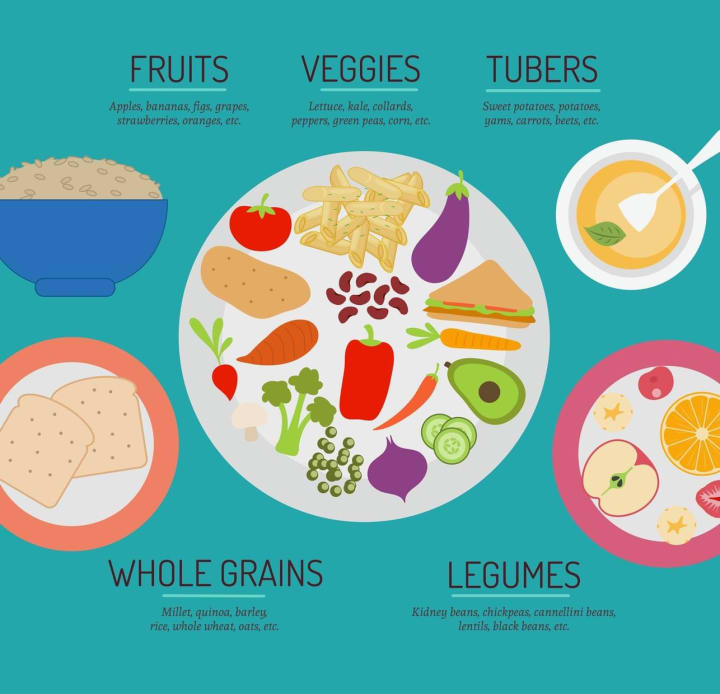
Now that we are more familiarized with the basics of a plant-based diet, let's talk about the benefits.
The Benefits of a Whole-Food, Plant-Based Diet:
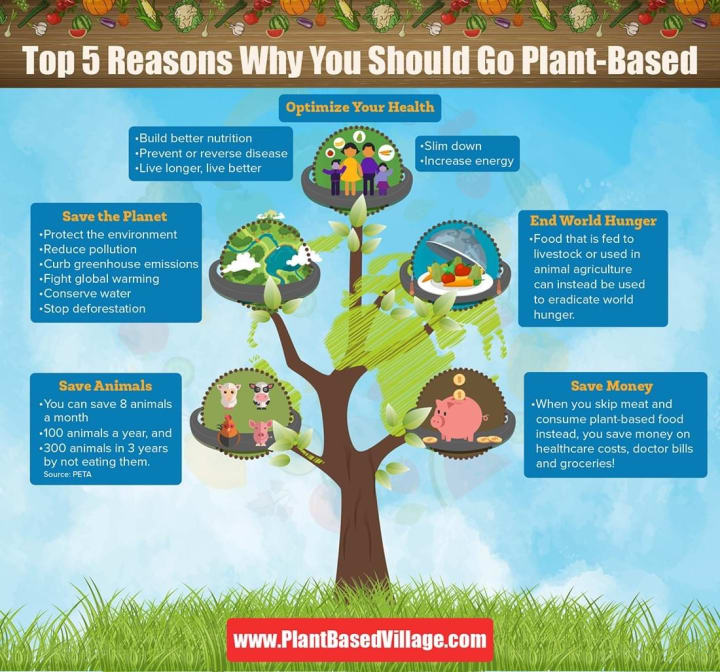
There are several major benefits to moving to plant-based nutrition, all supported by excellent science. These benefits include:
Easy weight management: People who eat a plant-based diet tend to be leaner than those who don’t, and the diet makes it easy to lose weight and keep it off—without counting calories.
Disease prevention: Whole-food, plant-based eating can prevent, halt, or even reverse chronic diseases, including heart disease, type 2 diabetes, and more.
A lighter environmental footprint: A plant-based diet places much less stress on the environment. Did you know that one of the biggest environmental pollutants we face is from methane due to the amount of cows we farm in big agriculture (their gas.)
Good luck! You can do this. You can do anything you set your mind to…once you forget “perfection.” Let’s take it one bite, one meal, one day at a time. Swapping out for a meatless Monday, or picking a new vegetable we have never tried. Truthfully, I have found that a plant-based diet actually offers so much more experimentation, fun, and variety in our nutrition, then I have ever experienced in eating the Standard American Diet (“SAD” for short.) It is “sad” that this has become normalized due to big food/big agriculture/big pharma. Let’s take back control of our health one conscious bite at a time, whether it’s for health, animals, our environment, or all! You hold the power to your healthy life!
Thank you so much for reading! If you find this piece interesting, please consider leaving a ❤️ below, or even a tip. Your support means everything to me as a writer! You can also read more of my stories & poems by clicking on my page! xo Nikki
About the Creator
NikkiDeeFit | Nicole DeFelice Oliver
Welcome!
My goal is to evoke emotions, senses, & feelings through the power of language/words! I am a Poet & Writer, Certified Personal Trainer, & nature lover.
Your support/tip/subscribe means the world to me, enjoy!
https://nikkideefit.com


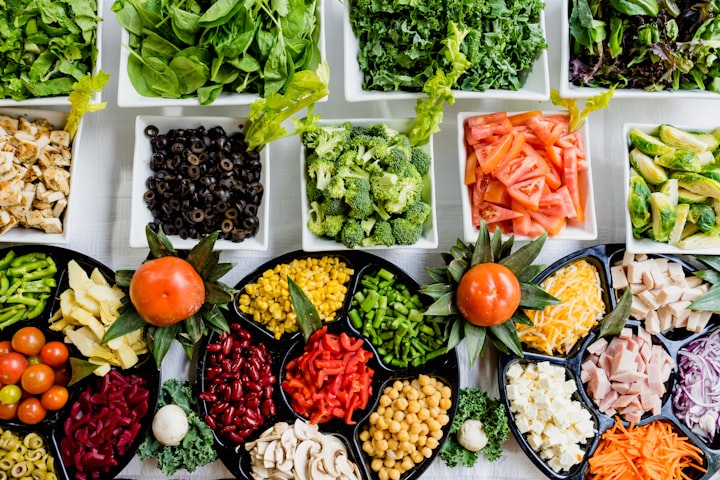



Comments (1)
Thank you for writing and sharing this article! It’s very inspiring and I plan to give it a go!